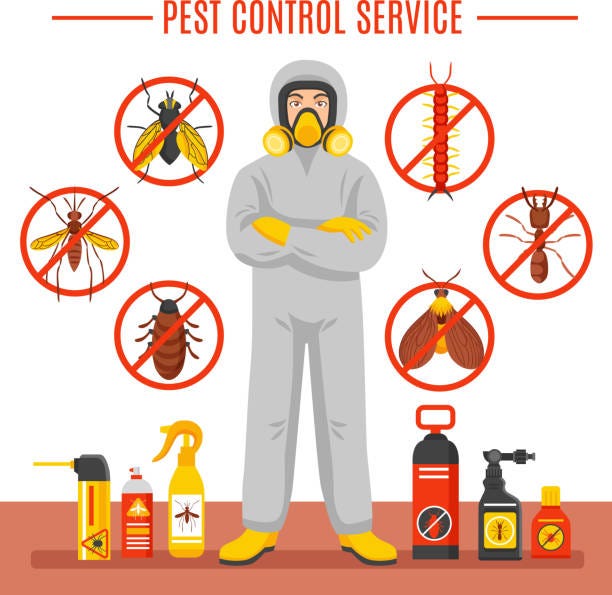Relax Easy with Orem Pest Control: Reliable Protection Versus Pest Intrusions
Relax Easy with Orem Pest Control: Reliable Protection Versus Pest Intrusions
Blog Article
Finding the Various Kinds Of Bug Control Techniques and Their Applications
Insect control is an important element of keeping a safe and healthy atmosphere, whether it be in domestic, industrial, or farming settings. Numerous methods have actually been established and refined for many years to properly take care of and alleviate bug problems. From chemical approaches that target particular pests to biological approaches that harness all-natural killers, the world of bug control is large and varied. Comprehending the different kinds of insect control techniques and their applications is important for implementing one of the most appropriate and lasting remedies. Let's discover the ins and outs of these techniques and just how they can be successfully utilized to resolve pest-related difficulties.
Chemical Parasite Control Methods
Chemical bug control techniques are commonly made use of in farming and parasite monitoring to successfully remove or control pest infestations. These techniques involve the use of chemical substances, such as herbicides, insecticides, and pesticides, to eliminate or minimize pest populaces that pose a risk to crops, livestock, or human wellness.
While chemical insect control strategies can be extremely effective in taking care of pest populations, they also raise worries concerning possible environmental and health and wellness risks. Incorrect usage or overuse of chemical pesticides can cause contamination of soil, water, and air, damaging non-target microorganisms and creating lasting ecological damages. Furthermore, repeated direct exposure to chemical residues might pose wellness dangers to farmworkers, customers, and wildlife. It is crucial to adhere to safety and security standards, make use of incorporated pest monitoring techniques, and think about alternate techniques to reduce the adverse impacts of chemical insect control techniques.
Organic Bug Control Approaches
 Biological bug control approaches use living microorganisms to handle and lower bug populaces in a eco pleasant and sustainable manner. One usual approach is the release of ladybugs to combat aphids in yards, as ladybugs are all-natural predators of these damaging bugs.
Biological bug control approaches use living microorganisms to handle and lower bug populaces in a eco pleasant and sustainable manner. One usual approach is the release of ladybugs to combat aphids in yards, as ladybugs are all-natural predators of these damaging bugs.
Biological insect control methods supply numerous benefits over chemical methods. In general, biological parasite control approaches present a effective and natural option to typical chemical treatments, promoting a balanced environment and healthier atmospheres.
Physical Bug Control Approaches
Using physical approaches to regulate parasites involves making use of non-chemical or mechanical methods to manage and minimize insect invasions efficiently. These approaches count on physical obstacles, catches, and other methods to prevent and eliminate bugs without the use of unsafe chemicals. One common physical bug control approach is the setup of fencings, internet, or screens to block parasites from going into specific locations. This technique is especially efficient in staying out insects and tiny pets from structures or yards.
An additional physical strategy is the use of traps, such as snap traps for rodents or pheromone traps for insects. These traps goal to record parasites without posturing any type of threat to people or the atmosphere. In addition, physical control approaches can consist of methods like handpicking bugs off plants, using vacuum gadgets to eliminate insects, or employing heat treatments to eradicate bed bugs and various other parasites in plagued areas.
Integrated Insect Monitoring Strategies
Executing a holistic approach to pest administration, Integrated Insect Monitoring (IPM) methods intend to integrate different reliable methods to avoid helpful hints and control bug invasions while minimizing environmental influence and ensuring lasting parasite control practices. IPM includes the integration of several control methods such as organic control, cultural techniques, mechanical control, and the careful usage of pesticides.

Moreover, IPM emphasizes the significance of surveillance and analyzing pest populations to establish one of the most suitable control techniques. By executing IPM techniques, insect control efforts come to be more targeted and effective, minimizing the dangers related to excessive pesticide usage and promoting long-lasting bug administration services.
All-natural and Organic Bug Control Options

One preferred organic parasite control method is neem oil, originated from the seeds of the neem tree, which serves as a repellent and interferes with the growth and advancement of insects. Diatomaceous earth, an all-natural silica-based powder, is one more reliable organic bug control option that works by drying out insects upon get in touch with. By incorporating organic and all-natural insect control alternatives into parasite management approaches, individuals can efficiently regulate insects while decreasing damage check my source to the environment and advertising lasting methods.
Final Thought
Finally, numerous bug control techniques such as chemical, organic, physical, integrated parasite administration, and natural options are available for successfully managing parasite infestations. Each technique has its own benefits and applications relying on the kind of pest and the atmosphere. By recognizing the different kinds of insect control strategies and their applications, people can make enlightened decisions on the most ideal approach to manage pests and secure their home.
Chemical parasite control techniques are commonly utilized in farming and bug management to properly remove or regulate pest problems - Orem Pest Control. Natural insect control approaches entail using organic control representatives, such as parasites or killers, to take care of pest populations. By including all-natural and natural parasite control alternatives right into bug monitoring approaches, individuals can successfully manage pests while minimizing damage to the atmosphere and advertising lasting practices
In final thought, different pest control strategies such as chemical, organic, physical, incorporated pest administration, and all-natural options are offered for successfully managing bug problems. By comprehending the various types of pest control methods and their applications, individuals can make educated decisions on the most proper approach to regulate insects and protect their home.
Report this page